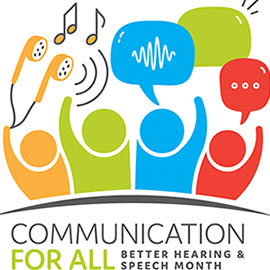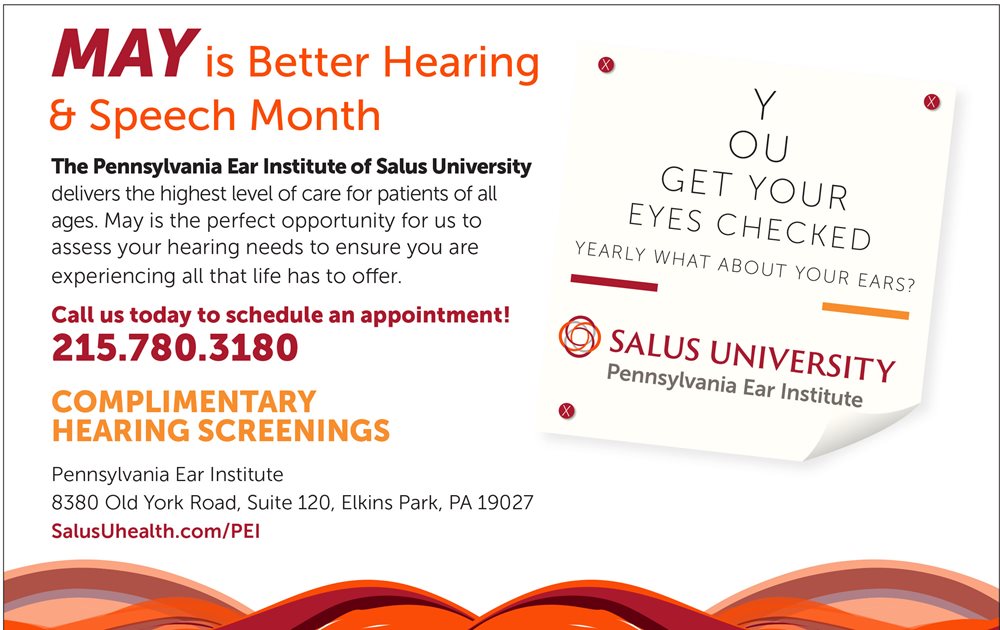Better Hearing and Speech Month
 According to the National Institute on Deafness and Other Communication Disorders (NIDCD), an estimated 46 million Americans experience difficulty hearing. Hearing loss generally happens over time but obvious signs can include: difficulty understanding speech, muffled sounds, ringing or roaring noises in the ear, and increasing the volume on the radio or television.
According to the National Institute on Deafness and Other Communication Disorders (NIDCD), an estimated 46 million Americans experience difficulty hearing. Hearing loss generally happens over time but obvious signs can include: difficulty understanding speech, muffled sounds, ringing or roaring noises in the ear, and increasing the volume on the radio or television.
Even if you haven’t noticed any signs of hearing loss, it’s never too early to protect your hearing. At loud concerts or in occupational settings, wearing ear plugs can help protect your ears from exposure to loud noise. When listening to music or watching television, especially with earbuds, monitoring the volume and the time you spend listening is important. Prolonged exposure to loud sounds can affect your hearing. Audiologists suggest being proactive with your hearing health and recommend annual screenings to monitor your hearing.
Each May the American Speech-Language-Hearing Association (ASHA) celebrates Better Hearing and Speech Month to raise awareness about communication disorders and the role audiologists and speech-language pathologists play in providing life-changing services. This year’s theme is “Communication for All.”
Healthy hearing is an important aspect of healthcare as it affects more than just people’s ability to hear the world around them. According to Dr. Lindsay Bondurant, director of the Pennsylvania Ear Institute, hearing loss has been linked to a number of other health-related issues, such as dementia, depression, cardiovascular disease, diabetes, hypertension, obesity and sleep apnea. Untreated hearing loss can also take a toll on people’s personal lives. However, most of Americans with hearing loss can be treated with hearing aids, and individuals who seek early treatment tend to show more significant benefits. Hearing aids are able to modify incoming sounds, making it easier for people’s brains to understand speech and other information around them. Using hearing aids can also reduce mental fatigue, decrease feelings of social isolation and depression, help improve memory, attention and focus and help improve communication skills.

“Hearing loss can be very subtle, and most people don’t realize the enormous impact it can have on their quality of life, including their relationships, employment, and ability to participate in activities that matter to them such as joining friends and families for meals, attending religious services or enjoying music,” Dr. Bondurant said. “Research shows a strong correlation between hearing aid use and quality of life. The longer a person lives with untreated hearing loss, the more it can negatively impact their quality of life. The sooner people talk to an audiologist about their hearing health, the sooner they can reconnect with the people around them.”
Join us at the Pennsylvania Ear Institute for an Open House on May 19 from 10:00 a.m. to 12:00 p.m. for a complimentary hearing screening and a tinnitus information session with expert Dr. Rebecca Blaha. You can also schedule a complimentary hearing screening throughout the month of May by calling: 215.780.3180.